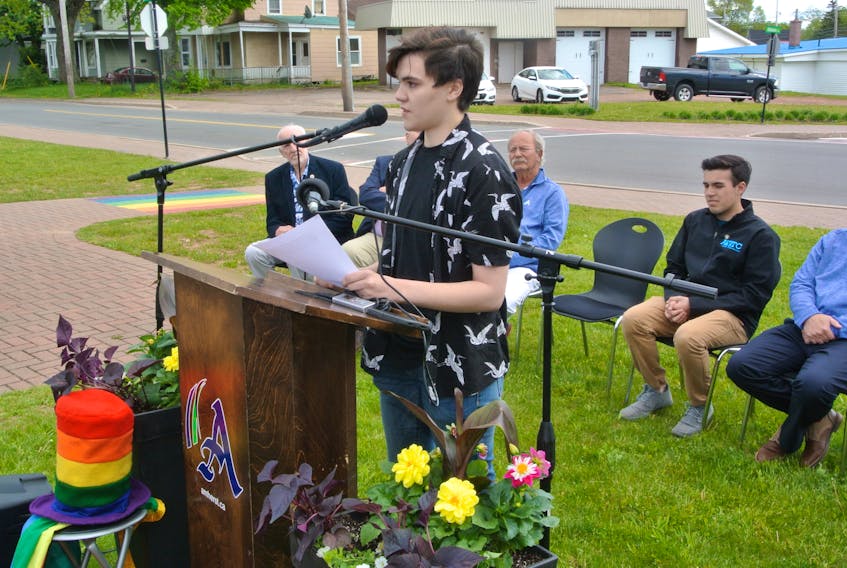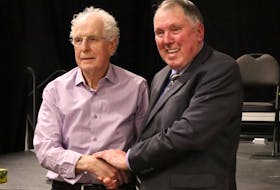Think back to the first things you learned about homosexuality. What messages did you receive from your family and friends about gender identity and sexual orientation? What about your school, or even your church? Chances are, the messages were not all positive, if there were any messages at all. Our understanding of sexual health, whether it comes from our family, schools or houses of worship, shape youth like me into the adults we will become.
My sexuality and gender, like other youth in Canada who identify as LGTBQ+, has evolved over the years. It has been confusing at times, but so is growing up. It is something that I have had to work through, and still am, but I do know that this is who I am.
My gender is certainly a problem for others.
I come from a religious family. My Nana and I used to go to church together, starting before I could walk up until two years ago when I turned 15; the same year I began to identify as Transgender. Several members of the congregation, but not all, refused to call me Mason and address me as a boy. One member asked me, “Why is a pretty little girl like you wearing a shirt and tie in Gods house?”
The church is not the only place where I struggle to feel included. In my school, and in my community, I am always negotiating for safer spaces: safer spaces where people will use my proper pronouns, accept me for who I am, and approach me with compassion and not fear.
Searching for people to accept me for who I am can be exhausting but I know I am lucky. And compared to other LGTBQ+ youth, I am very lucky: I wasn’t thrown into lockers, or had my head stuck in a toilet every other day; however, I do know what it is like to face violence and worry about my safety on a regular basis.
Education is a necessity. Without education we are less safe and less healthy, both physically and mentally. This applies to every aspect of health, including sexual health. Understanding sexual orientation and gender identity and how to be an ally to LGTBQ+ people is a good approach to ensuring that youth have good mental, emotional and physical health. Thankfully gender identity and sexual orientation is part of the Nova Scotia curriculum and taught in our schools. Still, in both my school and my community, I have to remind people that I am boy and that I deserve the same respect shown to other students.
When people do not accept me for who I am or think they can change my identity or my orientation, they are denying me my human rights. Imagine introducing yourself to someone and them insisting you are someone else: another person; another gender; refusing to recognize you any other way. It is deeply painful.
That is why, when recent news came that folks were coming to my county to preach anti-LGBTQ+ ideals, initially I felt ill. In our nearby community of Pugwash, an event will be held at a venue owned by the Seventh-day Adventist Church. At this event, speakers from a group known as “Coming Out Ministries” will visit from the United States, to share messages that homosexuality is a sin, immoral, and that we should convert or try to change our orientation through prayer.
It is bad enough when people tell you are not who you are; imagine people telling you that your God thinks that way as well. That not even God accepts you for who you are.
At the Sexual Health Centre where I volunteer, we are organizing a Safer Spaces LGBTQ+ Community Workshop in Pugwash to help bridge understanding and inclusion for youth like me and many others across our county. It is important that we accept youth for who they are, and not try to change us. I recently learned through our research at the Sexual Health Centre that it is legal in Nova Scotia for medical professionals and others to try to “convert” LGBTQ+ youth into heterosexual and bill our healthcare system for it.
Research shows that this practice dubbed “conversion therapy”, is ineffective and damaging. We have no protection against this practice in Nova Scotia and, as a result, LGBTQ+ youth like me are at an increased risk of poor mental health outcomes, suicide, and suicidal thoughts and actions. Protections are currently in place in Ontario and Manitoba, forbidding health care providers and medical professionals, and ultimately their healthcare systems, from this harmful practice.
I haven’t lost hope that with a little education and open-mindedness, we can make our community, and our province a safer space for its LGBTQ+ residents. I am asking youth of Cumberland County and beyond to help do what we can to educate others on what it means to be included.
Mason Carter is a volunteer with the Sexual Health Centre for Cumberland County which is planning a “Safer Spaces in Pugwash” LGBTQ+ Community Education Event on July 18, 6 .pm. at the Northumberland Community Curling Club in Pugwash. Everyone is welcome.









